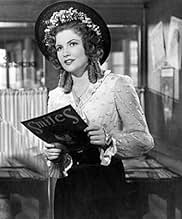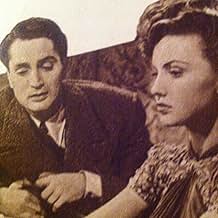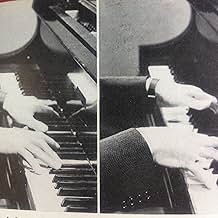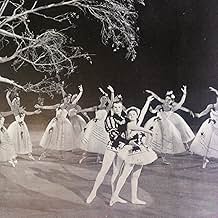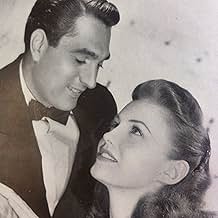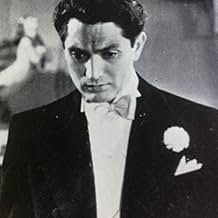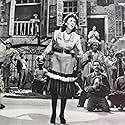CALIFICACIÓN DE IMDb
7.0/10
1.9 k
TU CALIFICACIÓN
Agrega una trama en tu idiomaGeorge Gershwin is a driven composer whose need to succeed destroys his relationship with singer Julie Adams and socialite Christine Gilbert.George Gershwin is a driven composer whose need to succeed destroys his relationship with singer Julie Adams and socialite Christine Gilbert.George Gershwin is a driven composer whose need to succeed destroys his relationship with singer Julie Adams and socialite Christine Gilbert.
- Dirección
- Guionistas
- Elenco
- Nominado a 2 premios Óscar
- 2 premios ganados y 4 nominaciones en total
Albert Bassermann
- Prof. Franck
- (as Albert Basserman)
Rosemary DeCamp
- Rose Gershwin
- (as Rosemary De Camp)
Opiniones destacadas
George Gershwin was perhaps, America's greatest composer. Judging by his output of popular songs, as well as some of the serious music he left behind. George Gershwin was a man that got his inspiration by a lot of the popular and black music he heard when he was growing up and mixed it with some of the classical music that he learned as a young piano student. The result is a body of work that is not easy equaled by any of his contemporaries.
In "Rhapsody in Blue", his biographical picture, director Irving Rapper has recreated that period in the young composer's life with the help of the screen play writers, Howard Koch, Sonya Levien, and the uncredited Clifford Odets, as he takes us along to witness a account on this original music man.
We get to see the ambitious George, who could play anything on the piano his parents intended for his brother Ira to study music. It was clear from the start George was a natural who had no problem composing some of the best melodies that became standards during the 20th century and continue to delight us after so many years.
Along the way there is the story of the man who falls in love with the lovely and sophisticated Christine Gilbert, who he met in France. Julie Adams, the girl who was to become the star in many of his shows, loved George in silence. Of course, these two women are a product of the writers imagination, or a composite for the real women in his life.
We are also shown the world in which George lived. There is Prof. Frank, who taught the young man the best of the classical piano repertoire. His parents, Morris and Rose, who adored their sons. We also meet some of the men that shaped his life like Max Dreyfus, his manager, Oscar Levant, his friend and best interpreter, along with some real figures like Paul Whiteman, George White, Al Jolson, Hazel Scott, among others.
Robert Alda resembled the real George Gershwin; his take on the man rings true. Joan Leslie is Julie Adams, and Alexis Smith is Christine Gilbert, the women in George life. Charles Coburn plays Max Dreyfus. Morris Carnovsky and Rosemary DeCamp are seen as the parents.
The best excuse to watch the film is the glorious music one hears in it. The movie is easy on the eye, and while it might not be accurate, it still makes for a pleasant view of this genius of some of the best American popular music of all times.
In "Rhapsody in Blue", his biographical picture, director Irving Rapper has recreated that period in the young composer's life with the help of the screen play writers, Howard Koch, Sonya Levien, and the uncredited Clifford Odets, as he takes us along to witness a account on this original music man.
We get to see the ambitious George, who could play anything on the piano his parents intended for his brother Ira to study music. It was clear from the start George was a natural who had no problem composing some of the best melodies that became standards during the 20th century and continue to delight us after so many years.
Along the way there is the story of the man who falls in love with the lovely and sophisticated Christine Gilbert, who he met in France. Julie Adams, the girl who was to become the star in many of his shows, loved George in silence. Of course, these two women are a product of the writers imagination, or a composite for the real women in his life.
We are also shown the world in which George lived. There is Prof. Frank, who taught the young man the best of the classical piano repertoire. His parents, Morris and Rose, who adored their sons. We also meet some of the men that shaped his life like Max Dreyfus, his manager, Oscar Levant, his friend and best interpreter, along with some real figures like Paul Whiteman, George White, Al Jolson, Hazel Scott, among others.
Robert Alda resembled the real George Gershwin; his take on the man rings true. Joan Leslie is Julie Adams, and Alexis Smith is Christine Gilbert, the women in George life. Charles Coburn plays Max Dreyfus. Morris Carnovsky and Rosemary DeCamp are seen as the parents.
The best excuse to watch the film is the glorious music one hears in it. The movie is easy on the eye, and while it might not be accurate, it still makes for a pleasant view of this genius of some of the best American popular music of all times.
As with most Hollywood biopics (particularly back in the 1930s, 40s, and 50s), this account of the life of George Gershwin is somewhat fictionalized. As just one example, in real life he also had two sisters, who are not even mentioned in the film. And, the romantic angles here (with two women) apparently are fictionalized. But, so what. This is a surprisingly entertaining film, and a number of Gershwin's pieces are faithfully executed, including "Rhapsody In Blue". I watched this quite a long time ago and remembered it as one of the better movie biopics...plus, I rather like Gershwin's music. I think I liked this film better the second time around.
Robert Alda is fine in the lead role, as are others in supporting roles, including Charles Coburn as a mentor on the pop side of things. Particularly interesting are the many "cameo" appearances by real associates of Gershwin -- Al Jolson ("Swanee"; although so clearly too old to play a young Jolson!), George White (of the famous "Scandals"), and Paul Whiteman. Supporting players are good here -- Joan Leslie, Alexis Smith, especially Albert Bassermann, Rosemary DeCamp, Oscar Levant, and Herbert Rudley (as Ira Gershwin).
At just over 2:20, it's a long movie, but that length allows so much of the Gershwin music to be played. I can't help but compare this to the Cole Porter biopic starring my favorite actor -- Cary Grant; but this is so much better a film. A good movie worth watching at least once for the acting and to revel in the music.
Robert Alda is fine in the lead role, as are others in supporting roles, including Charles Coburn as a mentor on the pop side of things. Particularly interesting are the many "cameo" appearances by real associates of Gershwin -- Al Jolson ("Swanee"; although so clearly too old to play a young Jolson!), George White (of the famous "Scandals"), and Paul Whiteman. Supporting players are good here -- Joan Leslie, Alexis Smith, especially Albert Bassermann, Rosemary DeCamp, Oscar Levant, and Herbert Rudley (as Ira Gershwin).
At just over 2:20, it's a long movie, but that length allows so much of the Gershwin music to be played. I can't help but compare this to the Cole Porter biopic starring my favorite actor -- Cary Grant; but this is so much better a film. A good movie worth watching at least once for the acting and to revel in the music.
Rhapsody in Blue, is a true black and white American classic. I bought the tape because of the title, which is one of the pieces written by George Gershwin. I had the privilege of going to the Library of Congress in Washington, D.C., and xeroxing some of Gershwin's hand written sheet music with his own signature in it. Wow! Just like he signs his name in the movie. The movie starts with his and his brother, Ira's, childhood, when they get the piano for Ira to play. Turned out that George became the pianist and Ira the lyricist. George never married but the movie is a love story between George and singer "Julie Adams" Joan Leslie (Yankee Doodle Dandy), who truly loved him. He was also romantically involved with Alexis Smith "Christine Gilbert" (The Age of Innocence). She was a socialite painter who lived in Paris. George would have married Julie, but he somehow was married to his music and ended up never marrying Julie, due to his early death. Each scene of the movie has the rhythm of Gershwin's music and the music played is a piece which corresponds that period of his life. To my surprise Al Jolson plays himself where he sings and dances. Remember him the guy that Warner Brothers decided to star him in their first partly-talking-picture, "The Jazz Singer" in 1927. The two Gershwin's had a wonderful relationship with their parents and Ira became their parent's caretaker because George traveled a lot. I love the fact that "George Gershwin" is played by Robert Alda (Imitation of Life), a great actor and singer and also father one of my favorite actors Alan Alda (M.A.S.H., Same Time, Next Year). Talent runs in the families in the cases at hand, (the Aldas and the Gershwins) and Robert and Alan Alda they looked a lot alike. This is a must see for anybody to see, specially Gershwin fans such as myself. It has an imaginable body of their work in this movie, their music is vibrant and happy. Favorite Scenes: Gershwin's parents getting their first piano to their apartment I believe up to the sixth floor of the building where they lived. George getting fired when he meets Julie because he gives her his own work to sing. Favorite Quotes: Ira: "Good Night Mr.Music." George: "Thank you Mr. Words." George: "It is only with music that I can prove my right to live." Dad Gershwin to George: "Take time to be happy, George." This is a great old fashion movie I think that you will love it as I have.
Thank God the film-makers trusted in the power of Gershwin's music to allow almost complete versions of the title composition, and "An American in Paris" to be included in the film - as well as many complete songs. All the music is superbly orchestrated and the songs sung beautifully by a wide variety of artists, many of whom were really the first artists to sing them. The film is excellently directed and photographed, with musical scenes well realised visually. The montage of Gershwin wandering about Paris as we hear "An American In Paris" is excellent - and the use of lights and shadows to film the orchestra playing "Rhapsody in Blue" is magnificent - would that contemporary films of orchestras were this imaginative.
Yes I know it is largely fiction - but so what? This is a tribute, not a documentary. And Alda is fine in the lead, backed by an excellent supporting cast. I loved this film from start to finish.
Yes I know it is largely fiction - but so what? This is a tribute, not a documentary. And Alda is fine in the lead, backed by an excellent supporting cast. I loved this film from start to finish.
This film presents many Gershwin tunes in great fashion with several great settings and great production numbers. Yes, it's unfortunate that the story line is so heavily fictionalized and even misleading. But, the sets are honest to the periods covered, several sequences are very tastefully done and fun, the show excerpts are good, and did I mention the music? As several other commentators have indicated, the music is faithfully recreated in long segments that bring you much or all of the tune.
If you come to this film to hear some wonderful Gershwin performed by some great artists staged with a lot of character and splash (my favorite set is Hazel Scott's Paris show), you won't be disappointed. The story line is simply a convenient string to tie together the thread of music.
If you come to this film to hear some wonderful Gershwin performed by some great artists staged with a lot of character and splash (my favorite set is Hazel Scott's Paris show), you won't be disappointed. The story line is simply a convenient string to tie together the thread of music.
¿Sabías que…?
- TriviaChico Marx sued Warner Bros for $200,000 for damages and "payment owed for services rendered." Marx alleged that the filmmakers used his name many times in the film. Studio officials admitted that Marx's name had been used in the film, but were unclear about what services the comedian had rendered. The parties settled for $10,000.
- ErroresChico Marx is referred to early in the film. Gershwin mispronounces the name as "CHEE-ko", which generally continues to this day. Chico's name is correctly pronounced as "CHICK-o".
- Citas
Oscar Levant: Tell me something, George... if you had it to do all over again, would you still fall in love with yourself?
- ConexionesEdited into Historia de un humorista (1952)
- Bandas sonorasEmbraceable You
(uncredited)
Music by George Gershwin
Lyrics by Ira Gershwin
Sung by Joan Leslie (dubbed by Sally Sweetland)
Selecciones populares
Inicia sesión para calificar y agrega a la lista de videos para obtener recomendaciones personalizadas
- How long is Rhapsody in Blue?Con tecnología de Alexa
Detalles
- Tiempo de ejecución
- 2h 15min(135 min)
- Color
- Relación de aspecto
- 1.37 : 1
Contribuir a esta página
Sugiere una edición o agrega el contenido que falta


